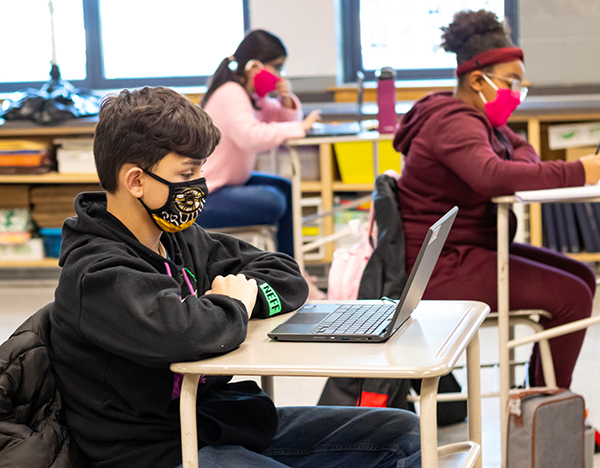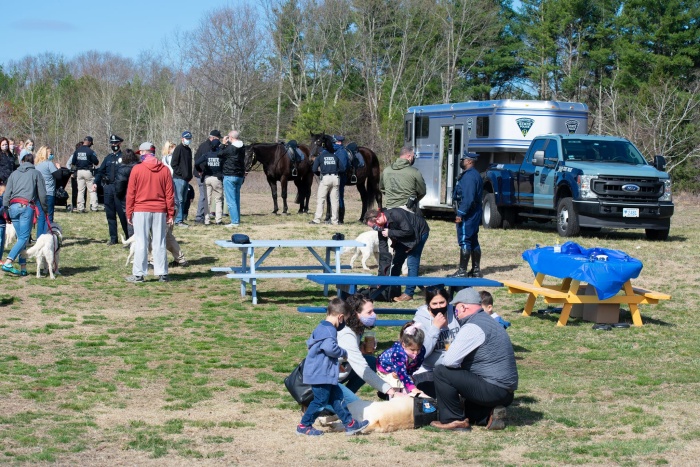By Katie Lannan
State House News Service
This year’s high school junior class will not need to take or pass MCAS tests in order to graduate, under a change approved Tuesday by the Board of Elementary and Secondary Education.
The move is one of a series of pandemic-influenced shifts the state has made within its standardized testing program since COVID-19 first shuttered school buildings last spring.
Students are typically required to pass 10th grade English and math MCAS exams in order demonstrate competency in the two subjects and graduate. Last year’s 10th graders, the class of 2022, did not have an opportunity to take those tests last spring because education officials obtained a federal waiver and legislative approval to cancel the spring 2020 MCAS administration in the early days of remote learning.
Juniors will still be able to take the test in the spring and next fall to pursue scholarship opportunities, but the board voted to modify graduation requirements for the class of 2022 to allow those students to demonstrate competency in math and English by completing a relevant course instead of earning a passing MCAS score.
The change, which board member Matt Hills described as a “very narrow, tailored approach” affecting one class and one component of the exams, cleared the board unanimously.
“I think we’re as far as we need to go, and I hope this is the end of the modifications to MCAS,” Hills said.
Darlene Lombos, the board’s labor representative, and Jasper Coughlin, its student representative, both said they’d like to have additional conversations about MCAS testing.
“During this year when it’s really easy for students to feel cold and to feel that there aren’t people at higher levels looking out for them, I think this is exactly the type of thing that shows students that we’re caring about them,” said Coughlin, a Billerica Memorial High School student.
The pandemic’s disruptions to schooling have renewed debates about the role of standardized testing, with teachers unions and some lawmakers calling for the MCAS to be canceled this year, and the Baker administration describing the exams as a key tool for gauging where students may have fallen behind while learning remotely.
Ed Lambert, executive director of the Massachusetts Business Alliance for Education, wrote to the board on Tuesday voicing a position that members of the class of 2022 should still be required to take the MCAS even if they are not required to earn a certain score to demonstrate competency.
Lambert said that past years’ passing rates suggest 85 percent or more students would achieve what would normally be considered a passing grade, and crossing that threshold would allow them “to know their diploma is of equal weight to those of previous classes of graduates.”
For other students, Lambert said, their scores would provide information that could be used “to create an Educational Proficiency Plan for their final year of school designed to assist them in meeting the essential standards prior to graduation.”
Board member Martin West suggested that schools encourage students to take the test, both for a chance to qualify for scholarships and to “learn about where they stand, relative to the expectations that we as a board have laid out for them.”
The board also voted to solicit public comment on Commissioner Jeff Riley’s proposed amendments to admissions regulations for vocational-technical schools. A final vote is expected in June after the comment period.
Among other changes, Riley’s proposal would give the schools flexibility to set their own admissions policies “that promote equitable access,” and would remove the requirement that grades, attendance, discipline record and counselor recommendation be used as admissions criteria.
Riley’s plan also would require each vocational school and program to annually submit its admissions policy to the state by Aug. 15 and would bar the use of selective criteria that disproportionately exclude members of protected classes, unless the criteria is “validated as essential to participation” and alternatives are unavailable.
Two Chelsea High School students, Aya Faiz and Emily Menjivar, told the board that criteria like grades, attendance, disciplinary records and recommendations can create barriers for students of color, who can face bias at school.
Faiz said she is “extremely cautious” about her behavior at school after getting suspended for two days in middle school for using a curse word. She said she saw her white peers instead get punished with detentions for cursing, and that Black and brown students are often viewed as “more adultified” in schools and therefore receive harsher discipline.
“We are handed higher expectations despite usually being from schools that have less resources and we are punished more severely for not meeting them,” she said.
Menjivar and Faiz are members of the Vocational Education Justice Coalition, which supports moving to lottery-based admissions.
Riley’s amendments seek to make clear that the Department of Elementary and Secondary Education can order changes to a school’s admission policy in cases of non-compliance, and those changes “may include requiring a lottery,” according to a memo outlining the proposal.
Another coalition member, Dan French of Citizens for Public Schools, urged the board to have updated rules for vocational school admissions in place by July so that school policies would be submitted for review this August, before the school year begins.
“We don’t need another year of a discriminatory and exclusionary state policy in place,” he said.
French said the new proposal does not go far enough because it gives each school “too much latitude” to interpret what criteria is allowable.
Board member Michael Moriarty called Riley’s recommendations a “stronger approach than simply imposing lotteries across all schools.” He said lotteries amount to “a solution that addresses access” but have “absolutely no eye on outcome.”













